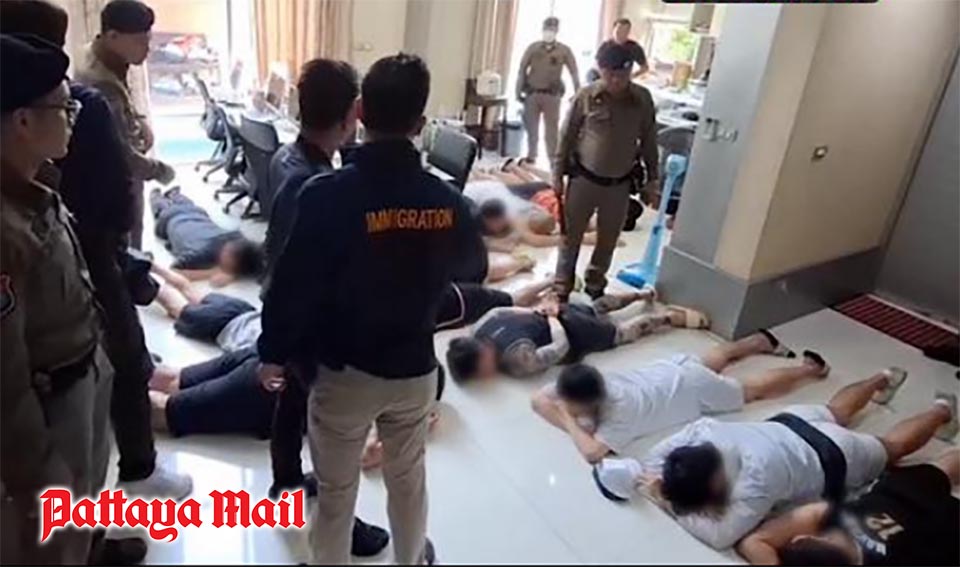
WWW.PATTAYAMAIL.COM
Deep-rooted labor challenges in Pattaya reflect national migrant worker system failures
Despite clear legal bans, undocumented migrants are increasingly found working in occupations reserved for Thai nationals across Pattaya.
PATTAYA, Thailand – Pattaya’s labor market is facing a hidden crisis: despite a persistent shortage of workers, an alarming number of undocumented migrants are stealthily taking up jobs legally reserved for Thai nationals. This paradox is happening even as employers publicly seek more foreign labor—and reveals deep flaws in Thailand’s migrant worker system.
Recent data from the Ministry of Labor reveals that between October 1, 2024, and June 20, 2025—the current fiscal year—authorities carried out nearly 752,000 labor inspections, resulting in 3,499 prosecutions. Of those prosecuted, 1,199 were migrants found working in occupations forbidden to foreigners, including hairdressing, Thai massage, street vending, tour guiding, vehicle driving, clerical roles, and more.
Thailand currently hosts about 2.3 million foreign workers under cabinet resolutions issued on September 24, 2024, and February 4, 2025. However, merely 46,709 of them—comprising 40,942 Cambodians, 5,582 Laotians, and 185 Vietnamese—have secured formal work permits. The remainder, approximately 1.98 million individuals, remain in the registration pipeline, with 1.83 million from Myanmar and around 155,000 from Cambodia awaiting final approval.
An additional 1.04 million migrants have been conditionally permitted to stay despite initially arriving without documentation, including 900,000 from Myanmar and over 110,000 Cambodians. Seasonal and cross-border workers number in the tens of thousands, and thousands more come under bilateral MOUs—about 184,800 Cambodians, 258,600 Burmese, and 251,300 Laotians.
Experts say the overcrowded and costly licensing system is a major contributor to the problem. “The registration process is complex and expensive, and corruption remains rampant,” says labor economist Dr. Phichan Lae Dilokwittayarat. “To resolve this, Thailand needs to introduce a low-cost One-Stop Service model to streamline foreign labor registration.”
At its core, Pattaya’s labor challenge stems from these national weaknesses. Employers—especially small businesses—often bypass legal channels to avoid bureaucratic hurdles. Migrant labor brokers profit from this opacity, ensuring their clients are quietly hired into prohibited roles without scrutiny. “Once they pay, they can blend in,” Dr. Phichan adds. “That’s how illegal employment thrives.”
“Once They Pay, They Can Blend In”. Dr. Phichan warns that under-the-table deals and opaque hiring practices fuel illegal employment, with brokers exploiting loopholes and employers evading scrutiny.
Local efforts to crack down on illegal labor are underway: across the country, 58,859 employers have been inspected, resulting in 1,724 prosecutions between October 2024 and June 2025. Still, enforcement is uneven, and Pattaya’s dense, informal economic sectors—such as roadside stalls, massage parlors, and markets—make it especially difficult to regulate hiring practices effectively.
Beyond the legal implications, this labor imbalance has real consequences for Thai workers. Many feel displaced by cheaper migrant labor, while others struggle as informal wages decline. Furthermore, employment standards may slip as businesses prioritize low overheads over qualifications and training.
For Thailand—and Pattaya in particular—a multi-faceted response is essential. First, streamline the migrant worker registration process to eliminate bureaucratic complexity and reduce opportunities for corruption. This includes setting affordable fees and establishing a true one-stop service system, as labor experts have long urged. Second, intensify enforcement efforts to dissuade employers—especially in the service and construction sectors—from hiring undocumented foreign workers into roles that are legally reserved for Thai nationals. Third, invest in vocational training and reskilling initiatives to equip Thai workers for sectors facing chronic shortages, such as caregiving, hospitality, and food service.
Equally crucial is public engagement. Authorities are calling on local communities to take an active role in reporting labor law violations. Citizens who witness the illegal employment of foreign workers or suspect migrants are working in occupations reserved for Thais can contact the Central Employment Registration and Jobseeker Protection Division at 02-354-1729, reach out to any of the Bangkok Employment Offices (areas 1–10) or provincial Employment Offices, or call the Ministry of Labor’s 24-hour hotline at 1506 (press 2).
The Department of Employment also operates a dedicated line at 1694. These channels are open to anyone and play a vital role in supporting fair labor practices and protecting opportunities for Thai citizens.
As Pattaya looks to recover stronger from pandemic disruptions, its success will depend on addressing these long-standing labor system failures—ensuring that foreign labor supports, rather than supplants, local workers, and that the city’s economy thrives on fair, regulated employment practices.
Pattaya’s hidden labor crisis exposes flaws in Thailand’s migrant worker system — experts urge reforms, enforcement, and public action to protect Thai jobs.
0 Commenti
0 condivisioni
12 Views


